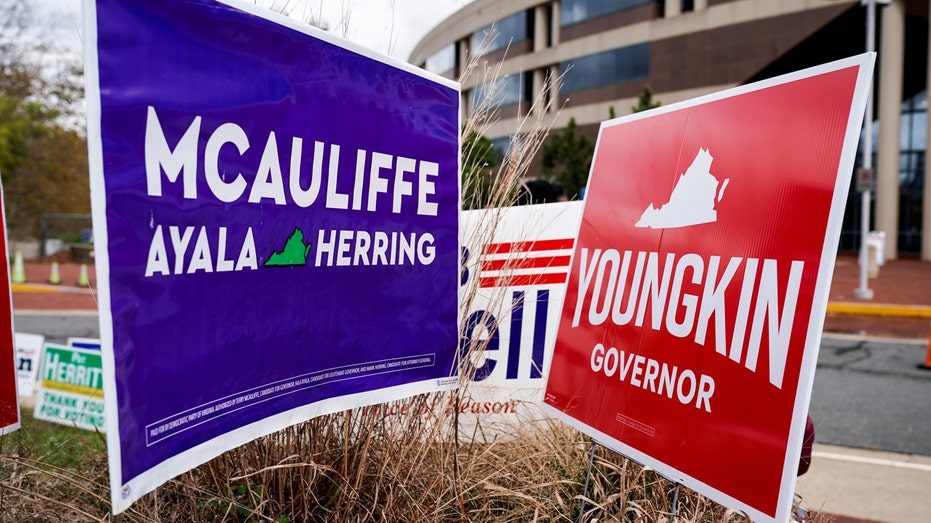Virginia governor-elect Youngkin's economic plan includes lower taxes, less regulation
Both Youngkin and McAuliffe have positioned themselves as job creators
Virginia voters head to the polls
Townhall.com editor Katie Pavlich and Washington Times opinion editor Charlie Hurt join Larry Kudlow to discuss the national impact of Virginia’s Governor race.
Republican Virginia Governor-elect Glenn Youngkin will attempt to implement his vision for a more business-friendly state economy following his upset victory over Democratic challenger Terry McAuliffe in a tightly contested election Tuesday night.
Youngkin, a longtime executive and former CEO at private equity firm The Carlyle Group, campaigned on promises to lower taxes and cut unnecessary business regulations. He has argued a rising cost of living has hurt the economy and driven many to leave the state.
"This is about government going to work for Virginians and getting our taxes down and making sure we have great schools and great jobs and safe communities," Youngkin said during an Election Day appearance on Fox News Channel. "And it's these issues that impact people's lives every single day."
ELECTION DAY: VIRGINIA, NEW JERSEY HOLD KEY GOVERNOR ELECTIONS SEEN AS BIDEN REFERENDUM
Youngkin’s plan to lower the cost of living includes lower income taxes, a requirement of voter approval to raise property taxes, the elimination of Virginia’s grocery tax and a one-year suspension of a recent hike to its gas tax.
Youngkin asserts Democratic economic policies have killed job growth. He campaigned against business lockdowns during the COVID-19 pandemic and pledged to streamline or cut operational requirements for small businesses.

Republican gubernatorial candidate Glenn Youngkin gestures as he speaks to supporters during a rally in Chesterfield, Va., Monday, Nov. 1, 2021. Youngkin will face Democrat former Gov. Terry McAuliffe in the November election. (AP Photo/Steve Helber)
The outcome of the Virginia gubernatorial race could have major implications ahead of the 2022 midterms, as Democrats and Republicans grapple over the best way to handle rising inflation, supply chain issues and a tight labor market.
Republicans throughout the country have argued President Biden’s economic policies of exacerbated the inflation crisis, warning the situation could worsen if Democrats succeed in passing an expansive social spending bill.

Democratic gubernatorial candidate former Gov. Terry McAuliffe, gestures as he speaks to supporters during a rally in Richmond, Va., Monday, Nov. 1, 2021. McAuliffe will face Republican Glenn Youngkin in the November election. (AP Photo/Steve Helber)
McAuliffe, who previously served as Virginia’s governor from 2014 to 2018, touted has experience revitalizing the state economy following the Great Recession. His business policies mirrored those embraced by the Democratic Party on the national level.
GLENN YOUNGKIN: FROM PRIVATE EQUITY TO POLITICS
The former governor pitched voters a plan to improve conditions for the state’s workers and address inequalities in Virginia’s economy. His plan called for a gradual increase in the state’s minimum wage to $15 per hour by the year 2024, expanded access to paid leave and a focus on career development through expanded education, including the establishment of a five-year pathway from high school to professional life.
Youngkin argued that McAuliffe’s policies would lead to higher taxes and only increase the state’s cost of living. Meanwhile, McAuliffe said his Republican opponent’s plan to slash taxes would leave the state with a budget shortfall that would force cuts to basic programs.
App users: click here.
The Northern Virginia Chamber of Commerce’s political action committee declined to endorse either McAuliffe or Youngkin for governor, with neither candidate earning a two-thirds majority vote among its membership. In September, the group said it would have confidence in either candidate to implement an effective business strategy for Virginia.

FILE PHOTO: Campaign signs for Democrat Terry McAuliffe and Republican Glenn Youngkin stand together on the last day of early voting in the Virginia gubernatorial election in Fairfax, Virginia, U.S., October 30, 2021. REUTERS/Joshua Roberts/File Phot (Reuters Photos)
GET FOX BUSINESS ON THE GO BY CLICKING HERE
"Virginia has before it a decision between two experienced leaders running for governor as major-party candidates," the Chamber of Commerce’s CEO and President Julie Coons said in a statement. "We are confident we can work with whomever is elected to serve as governor to advance a pro-business agenda that moves the region and the commonwealth forward."





















